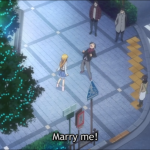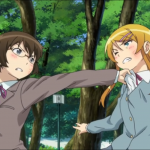Oreimo Season 2: Final Review
OREIMO Season Two & OVA Review
Japanese Title: Ore no Imōto ga Konna ni Kawaii Wake ga Nai
Also known as: Ore no Imōto ga Konna ni Kawaii Wake ga Nai
Genre: Comedy/Harem/Romance
Format: 12 Episodes
Allegiance: AIC Build
Director: Hiroyuki Kanbe
Vintage: 2013
Intelligence Agency Report by: Dr. Magnanimus
Kyosuke is confronted with the reality that he does, in fact, love his sister in a very unnatural but romantic way, and realizes that he must now tell the other potential girlfriends in his life the truth. One by one, he rejects their advances and confesses to them his love for Kirino, thereby sabotaging any potential relationships. Eventually, Kyosuke proposes to his sister in public, and she accepts. Later on, Kirino and Kyosuke realize the pain and ostracizing that will come about if they have an openly incestuous relationship, so they make a pact to keep it a secret from non-friends and to set a time limit on how long they will be together as a couple.
Field Agent Report by: Dr. Magnanimus
| Plot Characters Animation Audio Impact |
7.25 8.00 8.00 5.00 6.50 |
|
Overall |
6.75 |
Season two has been a weary journey for some, but the OVAs have finally put the romantic comedy to rest with a thrilling conclusion. And thrilling it certainly is, but for all the wrong reasons.
The first episode had a very weak lead-up to the hard-hitting events that come just before its midpoint. After a very short flashback of Kyosuke and Kuroneko’s summer romance to build up emotion in the first episode, we see him confronting her and confessing that his heart belongs to someone else. Regardless of your feelings for the tragic heroine, watching her symbolically rip apart her memories before his eyes and break down in tears is something that crushes all your emotions at once. From then on, things start to become more outrageous, as the scorned Kuroneko is spotted with Saori and her sister, who arrive on the scene to meddle in Kyosuke’s date with his “true love,” Kirino. Whether or not she is hoping to see events unfold herself as a way of closure, there’s something amiss about the anime’s decision to put Kuroneko in this situation without any focus whatsoever on how this breakup affected her future relationship with Kyosuke. Instead, she becomes an absurd cheerleader for his very public marriage proposal to his little sister. Although this is clearly the end of Kuroneko’s involvement for the rest of the series, her weak send-off is a slap in the face to anyone who appreciated and valued her as a strong lead character. As later events unfold, the remaining side characters get the same treatment as they are unceremoniously dumped in favor of Kyosuke’s sister.
It is equally troubling that there isn’t a strong opposition to Kyosuke’s unabashed admission of incestuous love, especially considering the lack of attention from their parents or even from civil authorities. The only challenge issued to the siblings comes from Manami at the climax of the third and final episode. The raw anger and frustration that burst forth from her is a genuine and somewhat refreshing break from this cringe-worthy romantic drama. However, Kyosuke emerges victorious with truly disgraceful enthusiasm for the new self-destructive lifestyle he has chosen for himself and for Kirino.
Neither of the two previous points, however, compare to the way the ending is handled. It manages to single-handedly discredit and suck out all remaining traces of enjoyment I had accumulated for the series as a whole. Kyosuke having successfully burned bridges with every important girl in his life, effectively making reconciliation with any one of them impossible, the new couple decides to handle the “incest problem” on their own terms. And how do they accomplish this? They date in secret for a short period of time, hold a pretend wedding in an empty chapel, and shortly after exchanging vows, they discard their rings and go back to being siblings again. Kyosuke broke the heart of every girl who cared about him and supported him throughout the span of the series, and in the end, his forbidden romance with his sister doesn’t last for more than a whole episode. Calling it a cop-out does not do this situation justice. In many ways, this is an utter betrayal of the emotional investment the audience has put into each and every character, leaving us with the feeling that Oreimo was swindling us out of our time and money all along.
In Japan, sibling romance seems to be trending as of late, with more than a dozen other stories of titillating forbidden love crafted and consumed in the last decade or so. The author of Oreimo himself, Tsukasa Fushimi, admitted that his story was originally intended for an otaku audience, implying that it was meant to pander to their escapist tastes in things such as eroge and related love fantasies. That said, however, this story wound up leaving a bad taste in my mouth, as one who lives mostly outside of this cloistered subculture. The first season was a great hook, when it’s all said and done. The pacing was good and kept me engaged. The characters were attractive, dynamic, interesting, and just plain entertaining to watch. There were moments of pandering fan service, but they were done tastefully and without compromising the plot or the atmosphere. Overall, it set high hopes for the seasons to come.
Unfortunately, season two and the OVA finale could not deliver. It started out strong in the beginning but began to lose steam toward the very end, seemingly without warning. There is little that could have been improved upon the anime, because the light novel source material was also flawed in how the ending was handled. We may never really know if this ending choice was the author’s true intention or not. But the unfortunate truth is that the Oreimo series, much like the hapless Kyosuke did to his pseudo-harem of potential girlfriends, succeeded in tearing out my heart and stomping on it without rhyme or reason. And so, as this summer of anguish comes to an end, I now close the book on Ore no Imōto ga Konna ni Kawaii Wake ga Nai, the bittersweet romantic comedy where everything is made up and the points don’t matter.




